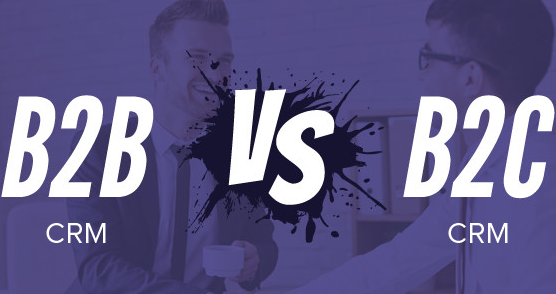CRM for B2B vs. B2C In today’s digital age, managing customer relationships has become more critical than ever. This is where Customer Relationship Management (CRM) systems come into play. But what exactly is CRM, and why is it so crucial for businesses, whether they are B2B (Business-to-Business) or B2C (Business-to-Consumer)?
What is CRM?
CRM stands for Customer Relationship Management. It’s a technology for managing all your company’s relationships and interactions with current and potential customers. The goal is simple: Improve business relationships to grow your business.
Importance of CRM in Business
CRM systems help companies stay connected to customers, streamline processes, and improve profitability. Whether you are dealing with other businesses or directly with consumers, a CRM system can be a game-changer.
Understanding B2B and B2C

Definition of B2B
B2B stands for Business-to-Business. This type of business involves transactions between businesses, such as between a manufacturer and a wholesaler, or a wholesaler and a retailer.
Definition of B2C
B2C stands for Business-to-Consumer. This type of business involves transactions between a business and the end consumer, such as a retail store selling products directly to shoppers.
Key Differences Between B2B and B2C
The primary difference between B2B and B2C is their target audience. B2B businesses market to other businesses, whereas B2C businesses market directly to consumers. This fundamental difference influences everything from marketing strategies to sales processes.
CRM Fundamentals
What is a CRM System?
A CRM system is a tool used by businesses to manage interactions with current and potential customers. It uses data analysis about customers’ history with a company to improve business relationships, specifically focusing on customer retention and ultimately driving sales growth.
Benefits of Using a CRM System
- Improved Customer Relationships: Understanding your customers’ needs and behaviors helps build stronger relationships.
- Increased Sales: Streamlined sales processes and better customer data can lead to more sales.
- Better Customer Service: With easy access to customer information, service agents can provide more personalized and efficient service.
Types of CRM Systems
- Operational CRM: Focuses on streamlining customer interactions and processes.
- Analytical CRM: Uses data analysis to better understand customer behaviors.
- Collaborative CRM: Facilitates better communication and collaboration among different departments.
CRM for B2B
Key Features of B2B CRM
- Lead Management: Tracking and managing potential leads through the sales pipeline.
- Sales Pipeline Management: Monitoring the progress of sales opportunities.
- Account Management: Managing detailed information about business accounts.
How B2B CRM Enhances Sales Processes
B2B CRM systems help sales teams by providing detailed insights into customer behavior and preferences, enabling them to tailor their sales strategies more effectively.
Examples of B2B CRM Tools
- Salesforce: A robust CRM tool with extensive customization options.
- HubSpot: Known for its ease of use and comprehensive features.
- Zoho CRM: Offers a range of tools for managing business relationships.
CRM for B2C
Key Features of B2C CRM
- Customer Segmentation: Grouping customers based on specific criteria.
- Marketing Automation: Automated marketing tasks such as email campaigns.
- Customer Service Management: Tools to manage customer service interactions.
How B2C CRM Enhances Customer Engagement
B2C CRM systems enable businesses to create personalized marketing campaigns and provide excellent customer service, which enhances customer loyalty and engagement.
Examples of B2C CRM Tools
- Shopify: Provides CRM features tailored for e-commerce businesses.
- Freshworks CRM: Known for its user-friendly interface and marketing automation features.
- Pipedrive: A sales-focused CRM tool with simple yet effective features.
Comparison: B2B vs. B2C CRM
Sales Cycle Length
B2B sales cycles are typically longer and more complex than B2C sales cycles, requiring CRM systems that can handle detailed tracking over extended periods.
Customer Relationships
B2B CRM focuses on building long-term relationships with businesses, whereas B2C CRM aims to attract and retain individual consumers.
Data Management
B2B CRM systems often need to handle larger volumes of data related to fewer, but larger transactions. B2C CRM systems handle data from numerous, smaller transactions.
Customization and Personalization
Both B2B and B2C CRM systems offer customization and personalization, but the approaches differ. B2B CRM customizes based on business needs, while B2C CRM personalizes based on individual customer preferences.
Choosing the Right CRM for Your Business
Assessing Your Business Needs
Before selecting a CRM, assess your business’s specific needs. Consider factors such as the size of your business, your target audience, and your sales process.
Evaluating CRM Features
Look for CRM features that align with your business objectives. Important features may include lead management, sales forecasting, and customer support.
Scalability and Flexibility
Ensure the CRM system you choose can scale with your business and adapt to changing needs.
Implementing CRM Successfully
Best Practices for CRM Implementation
- Define Clear Objectives: Know what you want to achieve with your CRM system.
- Choose the Right CRM: Select a CRM that fits your business needs.
- Train Your Team: Ensure your team knows how to use the CRM effectively.
Common Challenges and How to Overcome Them
- Resistance to Change: Address concerns and provide adequate training.
- Data Migration: Plan and execute data migration carefully to avoid data loss.
- Integration Issues: Ensure your CRM integrates smoothly with existing systems.
Training and Support
Ongoing training and support are essential to ensure the successful adoption and utilization of your CRM system.
Case Studies
Successful B2B CRM Implementation
Example Company: TechCorp
Solution: Salesforce
Outcome: Improved lead management and sales forecasting, leading to a 30% increase in sales.
Successful B2C CRM Implementation
Example Company: RetailPro
Solution: Shopify
Outcome: Enhanced customer engagement and loyalty, resulting in a 25% increase in repeat customers.
Conclusion
In conclusion, both B2B and B2C CRM systems play crucial roles in improving business relationships and driving growth. While their functionalities may differ, the ultimate goal remains the same: to provide better service, improve customer satisfaction, and increase sales. By understanding the unique needs of your business and choosing the right CRM system, you can achieve significant success in managing customer relationships.